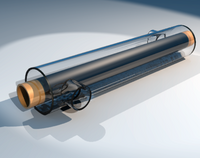
Photo from wikipedia
Abstract In this study, an optimization technique combined with a Random Vector Functional Link (RVFL) network in the form of a surrogate-assisted approach was carried out for the optimal design… Click to show full abstract
Abstract In this study, an optimization technique combined with a Random Vector Functional Link (RVFL) network in the form of a surrogate-assisted approach was carried out for the optimal design of counter-flow plate-fin compact heat exchanger (PFHE) with offset-strip fins considering different mass flow rates. Computational Fluid Dynamics (CFD) simulations generated dataset for training and testing by RVFL network, reducing processing time and assuring PFHE accuracy when applied in many-objective optimization based on Non-Dominated Sorting Genetic Algorithm III (NSGA-III). Next, the NSGA-III was designed to achieve the maximum effectiveness, minimum volume, and pressure drop at the hot and cold sides in PFHE design. For experimental validation the Shear Stress Transport (SST) k-ω turbulence model was used to simulate the flow and heat transfer in PFHE showing 4.36% and 3.27% of error, respectively, to pressure drop and convective heat transfer coefficient measurements. The optimized results by NSGA-III indicated that the volume and effectiveness values are in agreement with the literature, decreasing approximately 55.4% and 72.3% of pressure drop at the hot and cold sides, respectively, which showed that the convective heat transfer was enhanced and the flow resistance was also significantly reduced.
Journal Title: International Journal of Heat and Mass Transfer
Year Published: 2020
Link to full text (if available)
Share on Social Media: Sign Up to like & get
recommendations!